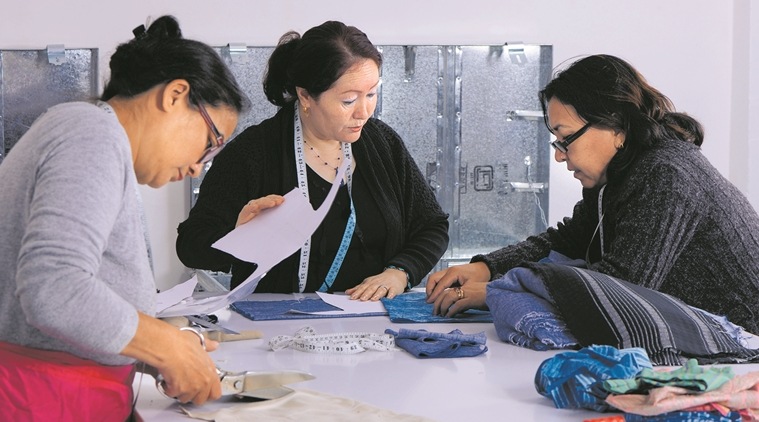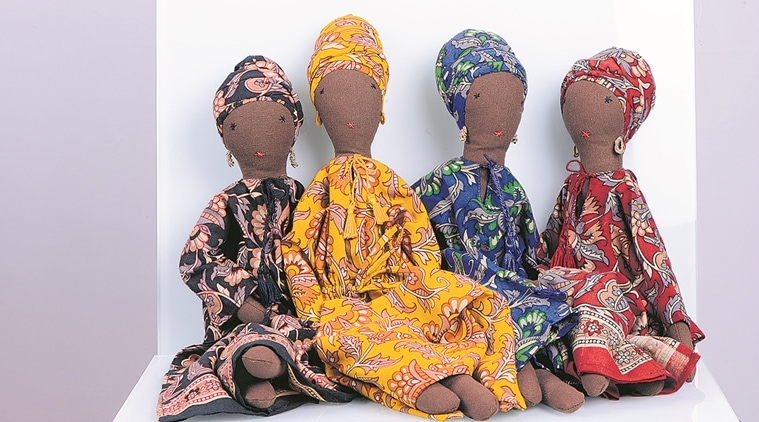A Capital-based couple is helping Afghani refugees find livelihood and some spirit by helping them create and sell rag dolls
Written by Ojasvi Gupta
At Delhi’s Khirki Extension, a group of women can be seen creating fabric dolls, while music in Dari, plays in the background. Gunjan, one of them, is a refugee in Delhi, who had to leave her entire life behind in Afghanistan’s Bamyan — a place known for its monumental Buddha statues destroyed by the Taliban in 2001. She moved to Delhi in 2015 along with her husband and three children. Her husband, who knows Pashto, Hindi and French, works as a translator, while she runs a stitching enterprise.
“People don’t understand my situation as a refugee. I struggled to find a job as I didn’t have an Aadhar card, and the only job I was offered demanded 12-hour work and paid only Rs 3000,” she says. “We had to leave our entire lives behind for our safety. Situations and circumstances are better here, but quality of life was better there,” says Gunjan.
But things got better after she met Iris Strill and Bishwadeep Moitra — the couple who founded Silaiwali in November last year. Silaiwali is a social enterprise that upcycles waste fabric generated from mass clothing manufacturers and uses it to create rag dolls by women refugees from Afghanistan. It works in association with UNHCR, the UN Agency for Refugees and Fair Trade Forum and Made51 Geneva. “There are so many people who are losing their homes and livelihood due to war and strife. We came in touch with a few Afghan women and wanted to help them find sustainable incomes through our skills and experience in design thinking,” says Moitra, a former journalist and graphic designer, who’s also written the book Brigitte Singh: Printress of the Mughal Garden (2018). His wife, Strill, runs the accessory brand Purple Jungle.
“Delhi-NCR is a major location for garment and soft-furnishing manufacturers for many international brands, and these productions generate a sizable quantity of waste fabric in the form of strips and end-pieces of the yardage. Usually, this waste is sold as garbage. But we decided to collect it from various factories and bring it to our studio where it is given a second life,” says Moitra. The large amount of waste fabric in the form of strips and end pieces makes the raw material for Silaiwali, where Gunjan, along with 11 other women, went through a month-long training in design, cut, stitch and embroidery. While most artisan centres, which mostly pay wages on the basis of the number of items an artisan makes, Silaiwali pays them a monthly remuneration. Plus work-life balance is easier, all of them live in the neighbourhood and work seven hours a day.
The women gave these dolls various skin tones to give them a universal appeal. “This was to show that the dolls do not conform to any nationality or race, and celebrate cultural diversity as their bodies are made of fabrics in different hues. Ethnic prints and natural materials sublimate a chic and bohemian fashion in a generous and mixed spirit. Far from the stereotypical offer of pink princess dolls, Silaiwali doll is a doll-woman of the world,” says Moitra. “Every doll is unique, wearing its own individual handmade outfit, and her story is attached with the tag to evoke an emotional connect,” he adds. The doll comes in its own box and after you open it, one sees it lying in its bed. Remove the bed cover and the doll is revealed, wearing different outfits such as muslin tunics, dresses and indigo kaftans. The packaging doesn’t use any plastic.
These dolls are available in various stores in Delhi, Bengaluru, Mumbai, Kolkata, and Goa. To celebrate World Refugee Day, Japanese brand Uniqlo had chosen to sell Silaiwali dolls as part of their fundraiser. A store for handmade products, Einzelstück in Zürich also sells them. In the future, they plan to make dolls available in the US and add new figures such as the horse and snow leopard.
Source: Read Full Article



